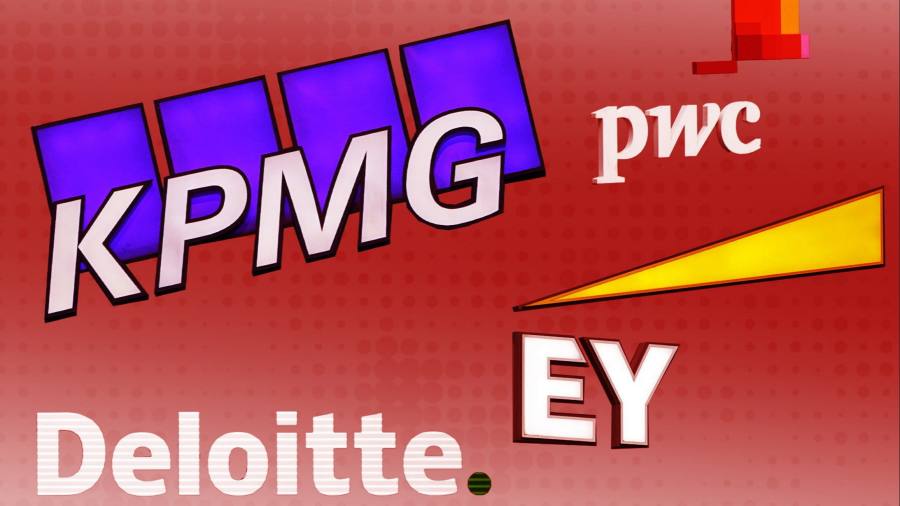
The finance heads of FTSE 100 companies have fired a warning shot at the Big Four over audit fees, telling the accountants to cut costs and avoid further significant increases after their prices rose 22 per cent in four years.
The letter from the 100 Group, representing the chief financial officers of most of the FTSE 100, sets up a potential stand-off between the UK’s biggest companies and the Big Four — Deloitte, EY, KPMG and PwC — where many partners’ annual pay has soared past £1mn.
In the letter to the accounting firms seen by the Financial Times, the finance heads said: “At this time of increasing cost pressure on big business we should not be expected to pick up the escalating costs within service company supply chains through further price increases.”
Ballooning costs meant companies “continue to struggle with our own profitability” and were having to be more efficient rather than passing costs on to customers, the CFOs said in the letter sent last month.
It was therefore “difficult for us to sit quietly as Big Four audit firms are announcing very significant pay rises”, they added.
The Big Four, which audit 98 of the FTSE 100 companies, have handed staff some of the biggest salary increases in years as they face a war for talent and high inflation in a sector where entry-level pay has barely moved for a decade.
PwC raised pay by at least 9 per cent for more than half its staff while graduate salaries at EY rose 13 per cent.
Audit fees have risen sharply since 2017 while FTSE 100 profits have stagnated or fallen, said the letter, signed by Margherita Della Valle, chair of the 100 Group’s main committee and CFO of Vodafone before her elevation this month to interim chief executive of the telecoms group.
Audit prices have surged in recent years as regulators increased enforcement over poor quality audits. The FTSE 100 companies paid their auditors more than £1bn in 2021, according to data provider Audit Analytics.
The letter drew a blunt response from audit partners at the Big Four, one of whom said: “[The CFOs] do not commission our work and they are not the ones who we are reporting to.”
Companies’ audit committees have become more focused on choosing the best auditor rather than the cheapest, according to accountants and audit committee chairs.
Asked about rising audit fees at a dinner for CFOs last month, Sir Jan du Plessis, chair of the UK accounting regulator, said: “I sound as if I’m stating the case for the audit firms but actually, if I’m the CFO or . . . the chair of an audit committee, I’m sorry to say [the audit fee] is the last place that I would look to cut costs.”
However, one senior Big Four partner said the CFOs “have a valid point”.
The firms’ UK arms had “done a good job of driving audit fees up” in recent years “under the auspices of quality improvement”, but the increases had been bigger than in other countries, the partner said.
The increases have been driven partly by mandatory auditor rotation and by an agreement between the Big Four and UK regulators to end persistent cross-subsidies of auditors by consultants.
EY and KPMG said they were investing heavily in audit quality, which was their priority. EY said several factors had caused fees to rise, including “the resources required to complete the work, the risks involved, and the increasing complexity of both audits themselves and the regulatory framework in which they’re carried out”.
KPMG said new regulatory standards would add between 5 and 20 per cent to the base cost of audits.
Deloitte said it had responded to the letter and “look[s] forward to discussing it . . . further” with the 100 Group. PwC declined to comment.
Additional reporting by Anna Gross